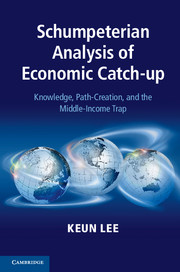Book contents
- Frontmatter
- Contents
- List of Figures
- List of Tables
- Foreword
- Preface
- Part I Introduction and perspectives
- Part II Empirical analysis at three levels
- 3 Knowledge and country-level catch-up
- 4 Knowledge and sector-level catch-up: Asia versus Latin America
- 5 Knowledge and firm-level catch-up: Korean versus US firms
- Part III Toward a theory and how to escape the trap
- Part IV Technological turning points and conclusion
- Appendix tables
- Notes
- Bibliography
- Index
3 - Knowledge and country-level catch-up
from Part II - Empirical analysis at three levels
Published online by Cambridge University Press: 05 June 2014
- Frontmatter
- Contents
- List of Figures
- List of Tables
- Foreword
- Preface
- Part I Introduction and perspectives
- Part II Empirical analysis at three levels
- 3 Knowledge and country-level catch-up
- 4 Knowledge and sector-level catch-up: Asia versus Latin America
- 5 Knowledge and firm-level catch-up: Korean versus US firms
- Part III Toward a theory and how to escape the trap
- Part IV Technological turning points and conclusion
- Appendix tables
- Notes
- Bibliography
- Index
Summary
Introduction
The determinants of economic growth remain an important puzzle in economics. To reflect the depth of this puzzle, debates on these determinants involve several contending factors, such as policies, institutions, and geography, as discussed in the influential articles of Acemoglu et al. (2001, 2002), Glaeser et al. (2004), and Rodrik et al. (2004). Despite the accumulation of knowledge and the increasing amounts of development aid and capital flow, many developing countries remain poor or fail to take off from initial growth momentums (Rodrik 1999; World Bank 2005). Recently, even the concept of the middle-income trap has emerged as an important concern in the development research community. Examples of countries that suffered from the middle-income trap are Brazil and Argentina, where growth stalled during the 1980s and the 1990s. Yusuf and Nabeshima (2009) discuss similar cases in East Asia, particularly those of Malaysia and Thailand. Only a very small number of former middle-income countries have moved beyond middle-income status to join the rich-country club. This growth divergence justifies a growth diagnostic to identify the binding constraints for growth in each country. Bottlenecks or binding constraints may be different not only for each country but also for different groups of countries.
This chapter analyzes the more concrete mechanisms by which innovation is generated at the country level. In other words, this chapter connects the question of growth divergence to the NIS and assumes the view that differences in the NIS lead to different outcomes in innovation and national economic growth. The study focusses on technological specialization, an aspect of the NIS, and determines whether latecomers should specialize in emerging technologies or in mature technologies following the product life-cycle theory. The other focus of the NIS is learning and the creation of knowledge, which is centered on the question of the role of indigenous creation and diffusion of knowledge versus reliance on a foreign knowledge base.
- Type
- Chapter
- Information
- Schumpeterian Analysis of Economic Catch-upKnowledge, Path-Creation, and the Middle-Income Trap, pp. 45 - 71Publisher: Cambridge University PressPrint publication year: 2013



